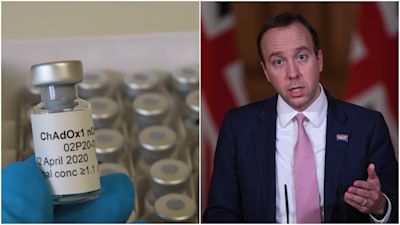Covid: Matt Hancock says vaccinations could start in England as early as December

Video report by ITV News Science Editor Tom Clarke
Vaccinations in England could start as early as next month providing it receives regulator approval, the Health Secretary has said.
His comments came after leaked NHS documents suggested that all adults in England could start to be vaccinated before the end of January if supplies allow.
NHS England’s draft Covid-19 vaccine deployment programme, seen by the Health Service Journal (HSJ) and dated November 13, comes as regional leaders have been told to prepare large vaccination centres to roll out a coronavirus vaccine.
Tom Clarke has more on how a vaccine could be rolled out across the country:
Under the plan, every adult who wants a jab could be vaccinated by early April.
Health Secretary Matt Hancock said he has asked the regulator MHRA – to assess the Pfizer/BioNTech coronavirus vaccine for use in the UK
He added that the company had already begun submitting data to the regulator and would submit its full data in the coming days.
Mr Hancock said: "If - and it still is an if - the regulator approves a vaccine, we will be ready to start the vaccination next month."
“This is another important step forward in tackling this pandemic,” he added.
The UK has ordered 40 million doses of the Pfizer jab and expects 10 million doses by the end of the year.
It has also ordered 100 million doses of a vaccine from AstraZeneca and Oxford University, which has shown promising results in clinical trials and is due to report before Christmas, and five million doses of a jab from US firm Moderna, which is not expected to arrive until the spring.
Watch the full Downing Street briefing:
Mr Hancock said the speed of the roll-out of a vaccine would depend on the speed it could be manufactured.
“If the regulator approves a vaccine we will be ready to start the vaccination next month with the bulk of roll-out in the new year.
“We are heading in the right direction but there is still a long way to go.”
He said: "This is a virus that has cast a shadow over this incredibly difficult year. And we've always known that the best long-term answer will be the ray of light provided by a vaccine.
"Right from the start, we've thrown everything we've got at the global search for a vaccine against Covid. The best scientific brains from all around the world have been working together on a solution.
"And the UK has funded more international support than any other country of any size. We should be very proud of the part that we've played to find a vaccine for all of humanity."
Asked by a member of the public whether black and Asian people would be given priority due to those communities being disproportionately affected by the virus, Mr Hancock said Joint Committee on Vaccination and Immunisation (JCVI), had looked at this issue“very carefully”.
He said the JCVI’s assessment so far was that “the most important determining factor in your risk is your age and of course the need to protect those who are in turn looking after the most vulnerable, the NHS staff and social care staff”.
Professor Jonathan Van-Tam, deputy chief medical officer, said: “We do know that a very significant proportion of the unfortunate but true signal we see in black and minority ethnic groups is driven by the presence of comorbidities that occur at an earlier age.”
But he said the JCVI’s provisional priority list will be targeting people according to having underlying risk conditions.
Prof Van-Tam said: “What is now really important is that the vaccine is accessible to all communities irrespective of their ethnic background and that people come forwards when they are called and the uptake is very high.”
Mr Hancock said it is still too early to say what contact people will be able to have over Christmas and what additional restrictions may be required after lockdown is eased.
"We’re doing the work on what happens after December 2 right now, it’s still too early to tell," he said.
“I’m afraid we still haven’t made those decisions.
“Over Christmas I know how important it is that we have a system in place, a set of rules that both keeps people safe but also allows people to see their loved ones.”
But he said that he has grown “more and more confident” that life will be closer to normal by spring.
He said: "Chris Whitty (chief medical officer for England) has said he hopes that we will be able to get back more towards normal by the spring.
"And with this news we’ve had over the last few weeks and with the expansion of mass testing I’m more and more confident that he’s right."
Covid: UK-wide plan for Christmas to 'allow people to see their loved ones' being discussed
Covid-19 cases levelling off in England and Scotland - decreasing in Northern Ireland and Wales
Mr Hancock was speaking alongside Medical Director of NHS England, Steve Powis, and the government's deputy chief medical officer Jonathan Van-Tam.
He led the press conference while Prime Minister Boris Johnson remains in self-isolation following a meeting with an MP who subsequently tested positive for coronavirus.
It comes following announcement that the R number - the reproduction rate of coronavirus - has dropped across the UK and is now closer to 1, down from between 1 and 1.2 a week ago.
Latest Government figures have recorded a further 511 people had died within 28 days of testing positive for Covid-19 as of Friday, bringing the UK total to 54,286.
The Government said that, as of 9am on Friday, there had been a further 20,252 lab-confirmed cases of coronavirus in the UK.
It brings the total number of cases in the UK to 1,473,508.